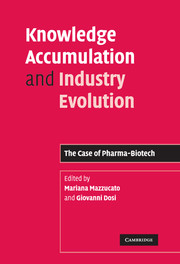1 - Introduction
Published online by Cambridge University Press: 22 September 2009
Summary
This book addresses, from a variety of perspectives, the patterns of innovation through the history of the pharmaceutical industry (which we take to include nowadays both pharmaceutical and biotechnology firms) and the ways that knowledge has coevolved with the dynamics of firm growth, industry structure and the broader socio-economic environment.
Ever since it began the pharmaceutical industry has indeed been an example of a “science-based” industry, whereby innovation is driven, to a large extent, by joint advances in pure and applied sciences, together with complementary progress in research technologies – undertaken both within public research institutions and business firms. As such, it is a fascinating industry to study. And it is even more so in the light of the profound changes that have occurred recently in the underlying knowledge bases – associated with the so-called “biotech” revolution – as well as in the broad institutional regimes governing the generation and appropriation of the economic benefit of innovations. The welfare and policy implications are equally paramount, given the socio-economic importance of the industry for health, agriculture and food production.
Let us start with a brief overview of the history of the industry, in order to give some background for the analyses that follow, and then proceed by flagging some of the central issues addressed by the chapters below.
The evolution of the industry: an overview
The history of the international pharmaceutical industry has already been extensively analyzed by several scholars.
Information
- Type
- Chapter
- Information
- Knowledge Accumulation and Industry EvolutionThe Case of Pharma-Biotech, pp. 1 - 18Publisher: Cambridge University PressPrint publication year: 2006
References
Accessibility standard: Unknown
Why this information is here
This section outlines the accessibility features of this content - including support for screen readers, full keyboard navigation and high-contrast display options. This may not be relevant for you.Accessibility Information
- 7
- Cited by
